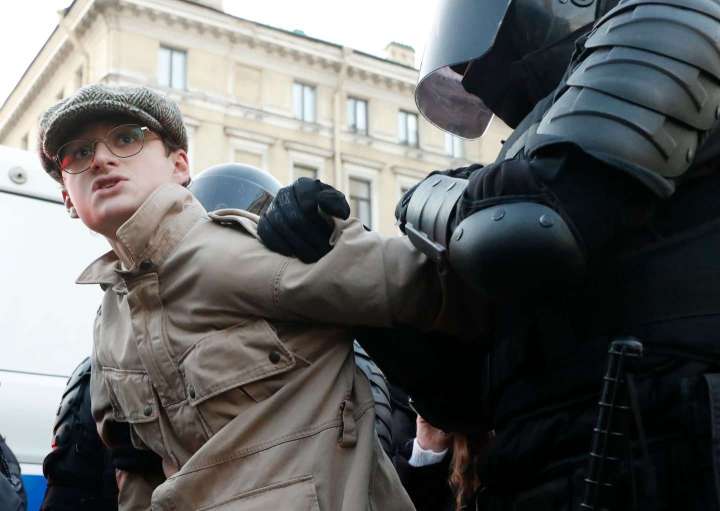It turns out there’s a good reason Russian dictator Vladimir Putin waited so long — nearly seven months — after launching his failing war of aggression against Ukraine before beginning even a partial mobilization of military manpower. The mobilization, announced last week, was intended to showcase Russian strength. Instead, it is revealing the hidden weakness of Putin’s kleptocratic rule.
Putin’s chaotic mobilization reveals the weakness of his dictatorship

Like many dictators, Putin is good at staying in power and looting the treasury — but little else. He might strut like a strongman, but when push comes to shove, he is revealed as a miserable coward presiding over the empty husk of a petro-state.
The internet is awash in images of antiwar protests in Russia, of men being rounded up against their will, of arson attacks and even armed attacks on recruiting offices, and of military-age men fleeing the country by car or airplane. While the mobilization was supposed to apply only to 300,000 personnel with prior military experience, there are reports of men with no military background — some with serious medical conditions — being drafted and sent to the front with little or no training. It remains unclear whether this is due to central directives from the Kremlin. It might simply be the work of overeager draft boards trying to show, like collective farmers in Soviet times, that they are exceeding the nonsensical quotas dictated by distant masters in Moscow.
This shambolic process will not produce well-disciplined and well-armed soldiers. It will produce cannon fodder. That might serve Putin’s purposes for the time being — even untrained recruits can thicken the lines and prevent a collapse of Russian positions — but it will come at a heavy cost of stoking internal unrest and opposition.
Follow Max Boot‘s opinions
FollowMost Russians were willing to acquiesce in the war as long as they didn’t have to sacrifice for it. Now that men are being press-ganged into service, Putin is bringing the war home in ways that are risky for a despot with little legitimacy.
Putin came to power after the chaotic post-Soviet period of the 1990s when crime and corruption were rampant and the state barely functioned. He stabilized the country for a time, but now he is generating unprecedented instability and demanding unprecedented sacrifice. There is no reason to think Putin’s cruel reign will end anytime soon, but he has definitely taken the riskiest gamble of his more than two decades in power.
Putin has staked everything on a war that he is losing. Instead of looking for a way out, he keeps doubling down in ways that prove counterproductive. He is doing what dictators high on their own supply so often do, which is to assume they know better than the professionals how to run complex undertakings such as military campaigns.
The New York Times reports that, at the beginning of the conflict, Putin overrode the concerns of Russian officers who said — correctly — that he “was going to war with insufficient troops and weaponry.” Now, the Times says, Putin is again injecting himself into tactical decision-making by refusing permission to evacuate troops from the southern city of Kherson, where they are in danger of being encircled by a Ukrainian counteroffensive.
Like Hitler refusing his army permission to retreat from Stalingrad, Putin might be leading his own soldiers to slaughter. If the Ukrainians manage to trap and cut off an estimated 10,000 to 15,000 Russian troops on the west bank of the Dnieper, it will be the costliest calamity yet for the Putin regime.
With the Russian army’s tactical situation deteriorating, the Kremlin keeps threatening to use nuclear weapons. But it is far from clear that Putin could achieve his objectives even by going nuclear. This desperate gambit could backfire, assuming the Biden administration makes good on its threats of “grave consequences.” That is admittedly speculative, but we do know that the threat of nuclear annihilation has not cowed Ukraine into submission.
While we should be concerned about Russia’s possible use of nuclear weapons, we should also be concerned about the costs of letting Putin get away with this evil war of aggression. If he can successfully carve up Ukraine, he could keep going, just as Hitler did after the invasion of Poland.
“Politicians are right to be fearful of a weakened and humiliated Russia,” writes James Nixey of the Chatham House think tank in London. “But logic suggests they should be even more wary of a strong and emboldened one.” Sooner or later, this monster must be stopped. The Ukrainians are willing to pay the high price of stopping him. They deserve our gratitude and support.
It is still impossible to know, more than half a year in, how this conflict will end. Putin is counting on the coalition against him to crack. But support for Ukraine remains strong in both Europe and the United States. Because they are grounded in popular support, democracies show a resiliency that many dictatorships lack. At this point, it appears that the Russian state might crack first.






